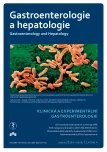Mastocytic enterocolitis as a possible cause of chronic diarrhea
Authors:
M. Bysterská 1,2; J. Šťovíček 1,3
Authors‘ workplace:
Gastroenterologická ambulance, ResTrial GastroEndo, s. r. o., Praha
1; Gastroenterologická ambulance, Poliklinika Budějovická, Medicon, a. s., Praha
2; Interní klinika 2. LF UK a FN Motol, Praha
3
Published in:
Gastroent Hepatol 2018; 72(4): 317-319
Category:
doi:
https://doi.org/10.14735/amgh2018317
Overview
The importance of mast cells in the gastrointestinal tract is well known. In addition to their role in allergic reactions and in defense against microbial and parasitic infections, they also play an important role in regulating visceral sensitivity and vascular permeability. Several studies have addressed the concentration of mast cells in the mucosa of patients with intractable cryptogenous chronic diarrhea and patients diagnosed with diarrhea-predominant irritable bowel syndrome. A new term, mastocytic enterocolitis, is used for a subset of patients with chronic intractable diarrhea with increased mast cells infiltration into the gut mucosa. The etiology is unclear. It is also unclear whether the accumulation of mast cells in the intestinal mucosa is a consequence or cause of mucosal inflammation. Regarding diagnosis, it is important to consider that intestinal biopsy samples may appear unremarkable on routine hematoxylin-eosin staining but show increased numbers of mast cells after immunohistochemistry for CD117 or mast cell tryptase. In this article we report the case of a 47-year-old female patient suffering from intractable diarrhea for 8 months, where the only pathologic finding was increased mast cell infiltration of gut mucosa. The patient was successfully treated with topical corticoids and antihistamines.
Key words:
mast cells – irritable bowel syndrome – mastocytic enterocolitis – chronic intractable diarrhea
The authors declare they have no potential conflicts of interest concerning drugs, products, or services used in the study.
The Editorial Board declares that the manuscript met the ICMJE „uniform requirements“ for biomedical papers.
Submitted: 20. 2. 2018
Accepted: 16. 3. 2018
Sources
1. Jakate S, Demeo M, John R et al. Mastocytic enterocolitis: increased mucosal mast cells in chronic intractable diarrhea. Arch Pathol Lab Med 2006; 130 (3): 362–367.
2. Ramsay DB, Stephen S, Borum M et al. Mast cells in gastrointestinal disease. Gastroenterol Hepatol (N Y) 2010; 6 (12): 772–777.
3. Guilarte M, Santos J, de Torres I et al. Diarrhoea-predominant IBS patients show mast cell activation and hyperplasia in the jejunum. Gut 2007; 56 (2): 203–209.
4. Hyungil S, Sang Hyoung P, Jeong-Sik B et al. Chronic intractable diarrhea caused by gastrointestinal mastocytosis. Intest Res 2016; 14 (3): 280–284. doi: 10.5217/ir.2016.14.3.280.
5. Hořejší V, Bartůňková J. Základy imunologie. 2. vyd. Praha: Triton 2002.
6. O’Sullivan M, Clayton N, Breslin NP et al. Increased mast cells in the irritable bowel syndrome. Neurogastroenterol Motil 2000; 12 (5): 449–457.
7. Ogilvie-McDaniel C, Blaiss M, Osborn FD et al. Mastocytic enterocolitis: a newly described mast cell entity. Ann Allergy Asthma Immunol 2008; 101 (6): 645–646. doi: 10.1016/ S1081-1206 (10) 60231-1.
8. Capannolo A, Viscido A, Sollima L et al. Mastocytic enterocolitis: Increase of mast cells in the gastrointestinal tract of patients with chronic diarrhea. Gastroenterol Hepatol 2017; 40 (7): 467–470. doi: 10.1016/j.gastrohep.2016.05.005.
Labels
Paediatric gastroenterology Gastroenterology and hepatology SurgeryArticle was published in
Gastroenterology and Hepatology

2018 Issue 4
- Possibilities of Using Metamizole in the Treatment of Acute Primary Headaches
- Metamizole at a Glance and in Practice – Effective Non-Opioid Analgesic for All Ages
- Metamizole vs. Tramadol in Postoperative Analgesia
- Spasmolytic Effect of Metamizole
- The Importance of Limosilactobacillus reuteri in Administration to Diabetics with Gingivitis
-
All articles in this issue
- Clinical and experimental gastroenterology
- Alveolar echinococcosis – a rare disease requiring a multidisciplinary approach
- The comparison of the efficiency of colon capsule endoscopy and optical colonoscopy in patients with positive immunochemical faecal occult blood test – multicentre, prospective study
- Experimental enteroscopy using a capsule with a side view
- EUS guided drainages with novel electrocautery-enhanced apposing metal stents (stent Hot AXIOS) in a cohort of 20 patients
- Mastocytic enterocolitis as a possible cause of chronic diarrhea
- The efficacy and safety of budesonide MMX (Cortiment®) for long-term maintenance therapy of ulcerative colitis
- Modulation of IL-12/IL-23 signaling pathways by ustekinumab alleviates inflammation in Crohn’s disease patients
- Clinical case of amoebic liver and pleuropulmonary abscess in a patient with chronic hepatitis B in Cotonou
- Hyponatremia in the context of gastrointestinal diseases
- XLVI. May hepatology days
- The selection from international journals
- Methotrexate – rediscovered drug for Crohn’s disease
- Gastroenterology and Hepatology
- Journal archive
- Current issue
- About the journal
Most read in this issue
- Hyponatremia in the context of gastrointestinal diseases
- Mastocytic enterocolitis as a possible cause of chronic diarrhea
- EUS guided drainages with novel electrocautery-enhanced apposing metal stents (stent Hot AXIOS) in a cohort of 20 patients
- Methotrexate – rediscovered drug for Crohn’s disease
